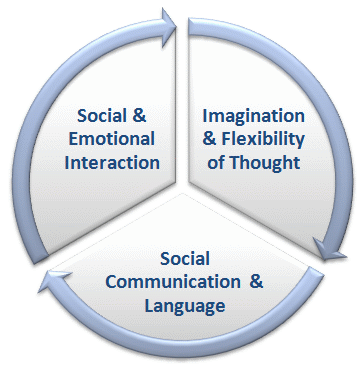Then, a couple of months ago, the school where I'm currently working sent me on a course about Autism. I learned about The Triad of Impairments (or, as some people prefer to call it, The Triad of Differences). Suddenly it was laid out in a way that made sense to me.

We talk a lot about the Autistic spectrum, but it's not (as I had imagined) a straightforward 2D spectrum. It's very much 3D.
Consider the graphic above.
Social & Emotional Understanding refers to the ability to understand social behaviour. Imagination & Flexibility of Thought refers to the ability to think and behave flexibly, and impacts on the development of restricted, obsessional, or repetitive activities or interests and difficulties in developing play skills. Social Communication & Language means the ability to understand and use non-verbal and verbal communication.
Each of these areas has its own spectrum, and any given individual can fall anywhere along each of them. Each of these areas also affects each of the other areas. Sensory sensitivities (again complex in their own right) overlap and affect them all. And underlying everything is a spectrum of cognitive ability. Some people imagine Autistics as Idiot Savants with one highly specialised skill. The truth is that this only occurs in about 10% of cases, and special skills can pop up anywhere along the cognitive spectrum. Some individuals may also have motor difficulties.
When we talk about "high functioning" Autism, what we actually mean is average to above average cognitive ability. A person with "high functioning" Autism may still find some or all of the other areas on the graph particularly difficult or distressing (note an interesting comment on Reddit by someone with Autism who calls high functioning Autism a misnomer). When we refer to someone with Aspergers, we are talking about someone with good verbal communication skills (though not necessarily good with non-verbal communication).
Having said all that, there's one more thing I think is important to mention. Why is there a movement toward calling this a Triad of Differences rather than Impairments? There's an argument that the Autistic brain is not impaired; it simply works differently. I'd love to do another blog post about that another day, but for now I'll leave you with this beautiful message from Jim Sinclair:
Being autistic does not mean being inhuman. But it does mean being alien. It means that what is normal for other people is not normal for me, and what is normal for me is not normal for other people. In some ways I am terribly ill-equipped to survive in this world, like an extraterrestrial stranded without an orientation manual.
But my personhood is intact. My selfhood is undamaged. I find great value and meaning in my life, and I have no wish to be cured of being myself. If you would help me, don't try to change me to fit your world. Don't try to confine me to some tiny part of the world that you can change to fit me. Grant me the dignity of meeting me on my own terms, recognise that we are equally alien to each other, that my ways of being are not merely damaged versions of yours. Question your assumptions. Define your terms. Work with me to build more bridges between us.
I hope that if you ever meet someone with Autism, you will use this information as a source of understanding and a guide for building bridges. Every child I've met has been a beautiful person, and every one of them has been my teacher as much as I've been theirs.

This is really great info., because there is so much misunderstanding about autism and the spectrum. People are using the term now in ways that are confusing.
ReplyDelete